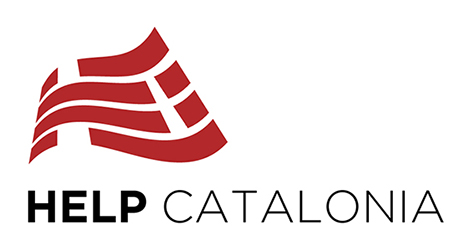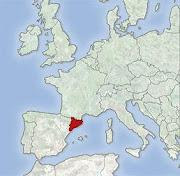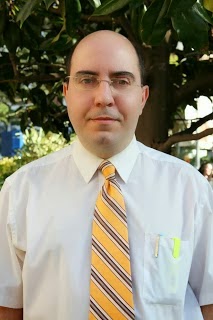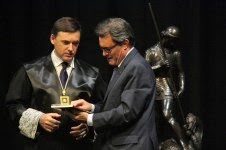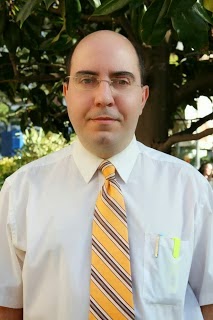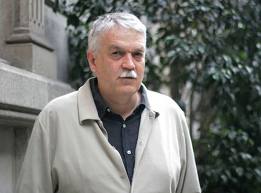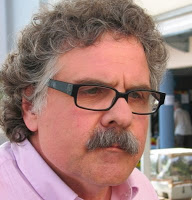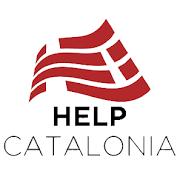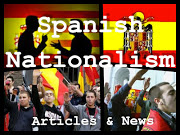The historical leader of conservative and moderate Catalan nationalism, Jordi Pujol, who chaired the Catalan Government for 23 years (1980-2003) and led the governing CiU for three decades, has been forced to renounce all of his honorary titles and posts, to give up his pension and to shut down his office as former President due to the fiscal fraud to which he confessed on Friday. Furthermore, all the opposition parties have demanded that Pujol provide further explanations to the Catalan Parliament, besides the fiscal and judicial processes that he will very likely face.
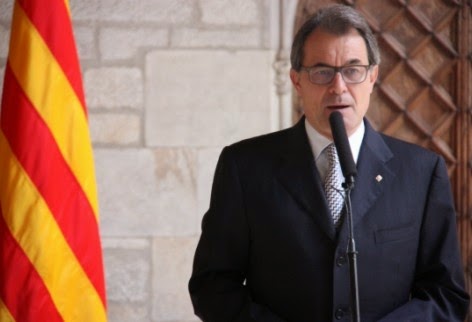 |
| President of the Catalan Government MHP Artur Mas |
The veteran politician explained that his family had kept a fortune in an Andorran bank since 1980, which was part of his father's inheritance and was not reported to the tax authorities during almost 35 years.
The confession arrived after two years of rumours and news regarding his family's fortune and after several of his sons faced judicial investigations for alleged fiscal offenses. The news shocked Catalonia's society since Pujol was a widely respected figure, regardless of individual ideology, and he had always defended hard work and honesty as values. Furthermore, he played a crucial role in the Transition from Franco's dictatorship to democracy and in Spain's modernisation and stability in the 1970s, 1980s and 1990s.
On Tuesday morning, Artur Mas, the current Catalan President and the political heir of Jordi Pujol, personally announced that the former President will have all his honorary titles taken away, including those in the party, as well as his pension and office. "I have had to take extremely complicated decisions in my political career, but this is the most painful one" since Pujol "is my political father" admitted Mas. Pujol founded the Liberal party CDC in 1974, which is the largest force within the centre-right pro-Catalan state two-party coalition CiU, which has run the Catalan Government since 2010. Mas' announcement is made the day before he will meet with the Spanish Prime Minister, Mariano Rajoy, to talk about Catalonia's self-determination demands.
On Tuesday morning, coinciding with the weekly Cabinet Meeting, the President of the Catalan Government, Artur Mas, addressed the press to announce the measures adopted regarding Jordi Pujol's confession. Mas explained that all the measures had been discussed with Pujol himself, who totally understood their need, added the Catalan President. At a party level, Jordi Pujol will no longer hold the honorary posts of Founding President of the CDC and Founding President of the CiU, the two-party coalition that has brought together the Liberal CDC and the Christian-Democrat UDC. In addition, "at a country level", Mas announced that Pujol would give up his pension as former President of the Catalan Government. This benefit is regulated by law and its amount depends on the time in office; it also includes an additional pension for the President's consort in case of death. Furthermore, Pujol would also renounce his office as former President of Catalonia, which was paid for with funds from the Catalan Government and had its own budget, a 3-person staff and an official car associated with it.
At a later stage, the Spokesperson from the Catalan Government and Minister from the Presidency, Francesc Homs, added that Pujol will also give up the Golden Medal of the Catalan Government. In addition, he will no longer be authorised to use the title of "Very Honourable", an honorary distinction that has been used to precede the name of the Presidents and former Presidents of the Catalan Government and the Catalan Parliament since the Middle Age.
Artur Mas announced the measures without reading from any papers and later he took questions from journalists. He explained that he knew about the fiscal fraud in the early morning on Friday, when Pujol explained the matter to him and told him that he had decided to issue a press release on the same day confessing to the facts. Mas admitted that he was totally shocked and upset, but he also wanted to highlight that Pujol had made great contributions to Catalonia throughout his entire life, "although some people might not understand why I am saying this now", he added. Mas said he was feeling "an immense sorrow" but also "compassion" for Pujol. He said that today's announcement and the decisions adopted were extremely painful for him as Pujol is his "political father". In fact, the veteran politician appointed Mas as his successor in 2001, two years before he quit active politics. Regarding this last point, Mas also wanted to emphasise that "in more than 10 years" Pujol has not taken "any important decision" within the party since he retired from the first line, explained Mas. Furthermore, the Catalan President also stressed that Pujol has not participated in Government decisions since 2003.
Parliamentary committee
In the morning, Mas was asked whether he supported the creation of a committee within the Catalan Parliament to investigate Pujol's fraud. The Catalan President said that he did not see the advantage of such a committee, taking into account that the Pujol family is already facing several judicial investigations and that presumably Jordi Pujol senior will have to face them in the coming weeks as well. Under these circumstances, the parliamentary committee would have a very limited impact since the Pujol family would keep their statements for the judge, who has a priority role, said Mas. However, the Catalan Government have revealed that they will not oppose any request launched by the Catalan Parliament regarding this issue.
On the same day, all the parties within the Catalan Parliament except the CiU have publicly asked Pujol to provide further explanations before the Catalan Parliament and have started the administrative procedure. All the parties have signed the document except the governing CiU. However, the centre-right governing coalition might end up signing the petition as well or at least not opposing it. Besides, a group of parties want to go even further and launch a parliamentary committee to investigate Pujol's fortune and go through his 23 years in power. The parties supporting this last initiative are the Spanish nationalist People's Party (PP) – who runs the Spanish Government – and Ciutadans (C's), as well as the Catalan green socialist and post-communist coalition, ICV-EUiA.
